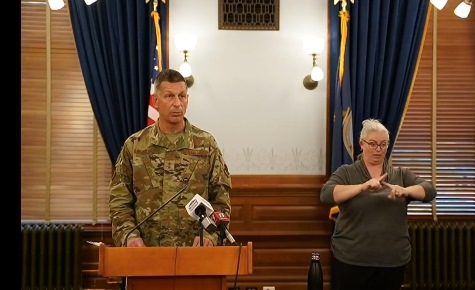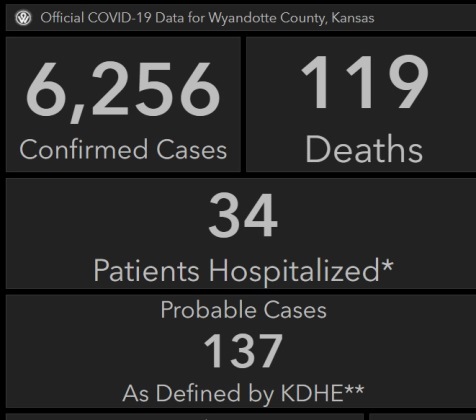

Gov. Laura Kelly will ask the State Finance Council on Friday to extend the state’s emergency declaration.
The emergency declaration will expire on Sept. 15 if it is not extended, bringing an end to federal and state support in fighting COVID-19 in Kansas.
At a news conference Thursday afternoon, Gov. Kelly said if the council fails to act on extending the declaration, they would have singlehandedly prevented the state’s ability to leverage critical resources needed to respond to many aspects of COVID-19 pandemic.
The State Finance Council, made up of nine leaders of the Kansas Legislature, most recently blocked Gov. Kelly’s plan to add $100 in Kansas funds to the $300 in federal unemployment payments. The $300 is replacing the $600 in federal payments previously added to unemployment payments.
Gov. Kelly sent a letter to the State Finance Council requesting the extension of the emergency declaration.
“Livelihoods and lives are at stake, and time is of the essence,” the governor wrote in the letter.
Gov Kelly said in the news conference that extending the emergency declaration will allow the Kansas Department of Health and Environment to provide community-based testing, which will help mitigate the virus threat, allow businesses to stay open and fight future outbreaks. Community-based testing is important for underserved communities, she added.
The emergency declaration would allow the Kansas Emergency Management Agency and the Kansas National Guard to continue providing vital support to food banks and food pantries statewide, she said.
In addition, it allows the Kansas Emergency Management Agency and the National Guard to provide hospitals and first responders with front-line personal protective equipment to keep workers safe and healthy, she said.
The governor testified earlier Thursdayto a House Committee about the importance of the federal government providing states with financial aid to help recover from COVID-19, and to protect state and local governments from drastic and damaging funding cuts. She discussed the Brownback tax cutting experiment, that left the state agencies hollowed and programs unable to provide essential services, to illustrate why it is important to support states and keep the economy stable, she said.
If the federal government allocates more funding to the states, Kansas will not be able to access any of it without a state emergency declaration in place, Gov. Kelly said.
“I implore them to put public health before politics and make the right decision,” she said.
Maj. Gen. David Weishaar, director of emergency management and adjutant general for the state of Kansas, said the Kansas Division of Emergency Management activated the emergency operations center at the beginning of March as the first cases began to appear. It allowed the state’s response of uninterrupted deployment of personnel, supplies, equipment, materials and facilities.
Since March they have received more than 2,750 requests for assistance and delivered 41,000 cases of personal protective equipment throughout the state, he said.
If the declaration is not renewed, this state response effort will cease Sept. 15, he said. It would terminate the state and federal resources needed to support the response effort, he added.
Gen. Weishaar said their testing response has focused on unserved communities, and the Kansas National Guard has tested 18,000 people, including those at meatpacking plants.
Statewide, food banks and food pantries have had a lack of volunteers, and Kansas National Guard packaged 6.8 million meals to distribute across the state, he said.
The Kansas National Guard handled requests for more than 250,000 test kits, 15,000 nasal swabs and more than 2 million N95 masks to first responders and providers, he said.
The Kansas National Guard provided transportation, driving 211,000 miles across Kansas to make deliveries, and have visited all 105 counties, he said. They had 37 transports of remdesivir with partners, and the national guard transported more than 10,000 test samples, he said.
They also provided noncongregate shelters in six counties and supported universities and colleges in two counties, he said.
There were 670 guardsmen on duty on May 18, and currently, there are 150 on duty in Kansas, Gen. Weishaar said.
He said a state of disaster declaration is required for assistance through the emergency management compact. They anticipate future needs for professionals, nursing staff, doctors and shelter managers.
The state emergency shelter is currently staffed seven days a week, he said. If they don’t have a disaster declaration, it would not be staffed seven days a week.
Without a declaration, all deployments and task assignments would end, he said. He is working with state officials to extend the current disaster declaration, he added.
Gov. Kelly also said that she was on a phone conference Thursday with Dr. Deborah Birx, of the White House Task Force on Coronavirus. Dr. Birx reminded Kansans that they are in the “red zone,” with the eighth highest positivity rate in the nation, and suggested some mitigation actions.
“We have a lot of work to do,” Gov. Kelly.
On Thursday, Wyandotte County reported a cumulative 6,256 cases, an additional 43 cases since Wednesday, according to the Unified Government COVID-19 webpage. There were a cumulative 119 deaths, no increase since Wednesday.
In Wyandotte County, the Unified Government Commission extended the local emergency declaration on Sept. 3. It will go through Dec. 14.
The University of Kansas Health System reported 22 acute COVID-19 patients in the hospital on Thursday morning, wth three in the intensive care unit and one on the ventilator, according to Dr. Dana Hawkinson, medical director of infection control and prevention. There are another five patients in the recovery stage who are on ventilators, he said. There are also 30 more COVID-19 patients in the hospital who are recovering and are not in the acute stage, he said.
The KU news conference included KU doctors who treat cancer, who said that there has been a decrease in diagnoses during the last several months. It’s not that there is less illness, it’s that patients are delaying their examinations and treatments, according to the doctors. The doctors said patients can make a better recovery if they catch and treat cancer early.
The text of Gov. Kelly’s letter:
Members of the State Finance Council,
As you are aware, during the 2020 Special Session, the Legislature extended the COVID-19 state of disaster emergency through September 15, 2020. The Legislature also provided the Finance Council the ability to approve, by a vote of six legislative members of the Council, additional 30-day extensions of the state of disaster emergency beyond September 15 if needed. Such an extension is, in fact, needed. Accordingly, I have called a meeting of the Council tomorrow, September 11, 2020, at 10:00 a.m. to extend the state of disaster emergency through October 15, 2020.
The facts of the COVID-19 pandemic in Kansas are well known. More than 47,000 Kansans have tested positive, with cases in each of our 105 counties. During September, we have averaged more than twice the new cases per day our state experienced during the initial peak in May. Almost 500 Kansans have died. Unfortunately, we know more will get sick, and more will die; but we can minimize the pain and suffering this virus brings through our emergency response efforts. The emergency continues, and we must be able to deal with it effectively, as a state.
So far, our state emergency response has been essential to our efforts to mitigate the spread of COVID-19 and respond to cases and hotspots that do arise. The State Emergency Operations Center has received over 2,765 requests for emergency resources and has delivered 40,750 cases of personal protective equipment throughout our state. Emergency operations have also provided resources such as enhanced community-based testing, statewide food banks, delivery of medical supplies like Remdesivir, and non-congregate shelters. To fund such activities, we rely heavily on federal support. As you know, all of these resources and activities—and that federal support—ends if the state of disaster emergency is allowed to expire.
The state of disaster emergency also provides other essential assistance and protections for Kansans. As you know, I have issued executive orders to ease the pandemic’s burdens and threats on Kansans. Those orders include measures reducing barriers for online driver’s licenses renewals, emergency measures to protect residents in adult care homes, prohibiting COVID-related evictions and foreclosures, and requiring simple but effective protective measures like wearing masks, especially in our schools.
Each of these critical services for Kansans will end if the state of disaster emergency expires. Additionally, as you have heard from prosecutors across Kansas, our criminal justice system requires emergency flexibility to deal with the challenges of holding jury trials and speedy trial rules. If the state of disaster emergency expires, our prosecutors will be forced to dismiss charges against criminal defendants accused of serious violent crimes if they cannot try those cases before February. These are just some of the consequences that will follow if the state of disaster emergency is allowed to lapse.
I wish that I did not have to come to you asking to extend this state of disaster emergency. Like all Kansans, I want to have this pandemic behind us and move on to the ever-present challenges of improving education, opportunity, and equality for all Kansans. But COVID-19 is not behind us, nor will it be for some time.
Livelihoods and lives are at stake, and time is of the essence. I know that as legislative leaders, you have been part Kansas’s emergency response from Day One – none of this is new to you. I know you understand what’s at stake.
I look forward to our meeting tomorrow, doing the right thing for our state, and working together to keep Kansans safe and healthy during this unprecedented public health emergency.
Testing offered Friday
Testing is scheduled to take place from 9 a.m. to 3 p.m. Friday, Sept. 11, at the Health Department parking lot, 6th and Ann, Kansas City, Kansas, weather permitting.
Check with the UG’s website, Health Department Facebook page or call 311 to see if there are any changes in the schedule because of weather. Information about testing is at https://wyandotte-county-covid-19-hub-unifiedgov.hub.arcgis.com/pages/what-to-do-if-you-think-you-have-covid-19.
Gov. Kelly’s news conference is at https://www.facebook.com/GovLauraKelly/videos/551726892300694.
The KU doctors’ news conference is at https://www.facebook.com/kuhospital/videos/312418130061093.
The UG COVID-19 webpage is at https://alpha.wycokck.org/Coronavirus-COVID-19-Information.
The KDHE active cluster list is at https://www.coronavirus.kdheks.gov/160/COVID-19-in-Kansas.
The Unified Government COVID-19 hub outbreak map at https://wyandotte-county-covid-19-hub-unifiedgov.hub.arcgis.com/.
To see an NEA list of schools that have had COVID-19 cases, visit https://app.smartsheet.com/b/publish?EQBCT=aa3f2ede7cb2415db943fdaf45866d2f
The KC Region COVID-19 Hub dashboard is at https://marc2.org/covidhub/.
The Unified Government Health Department is collecting input on people’s experiences getting tested for COVID-19 in Wyandotte County. The survey is on the UG website at https://us.openforms.com/Form/ea97a450-3d74-4d86-8d1f-6e340d55cf7c.
The UG Health Department new school and sports guidance is online at https://alpha.wycokck.org/files/assets/public/health/documents/covid/09042020fallsportsrecommendations.pdf.
A previous UG sports order is online at https://alpha.wycokck.org/files/assets/public/health/documents/covid/08132020localhealthofficerorderregardingsports.pdf.
The Wyandotte County school start order is online at https://alpha.wycokck.org/Coronavirus-COVID-19-Information.
Wyandotte County is under a mandatory mask order and is in Phase 3 of the state’s reopening plan. For more information, residents may visit the UG COVID-19 website at https://alpha.wycokck.org/Coronavirus-COVID-19-Information or call 311 for more information.
The KDHE’s COVID-19 webpage is at https://www.coronavirus.kdheks.gov/.
The CDC’s COVID-19 webpage is at https://www.cdc.gov/coronavirus/2019-nCoV/index.html.
